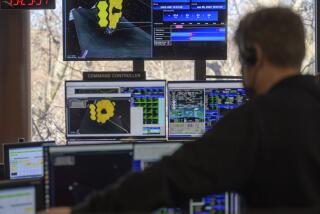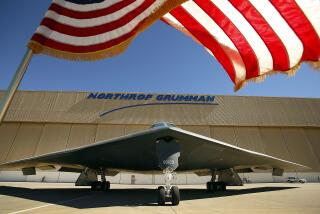Pentagon to Pay Firms for York Orders : Impact of Gun’s Cancellation Likely to Be Minimal
- Share via
Although the sudden cancellation of the Sgt. York anti-aircraft gun stunned the defense industry, the financial impact on the contractors involved in the program is likely to be minimal, according to subcontractors and Wall Street analysts surveyed Wednesday.
The Pentagon confirmed that it will pay Ford Aerospace and Communications, the Newport Beach-based prime contractor, and its 2,000 subcontractors for all 146 of the tank-mounted gun systems that the Army had ordered, even though only 65 of them have actually been delivered.
Army spokesman Lt. Col Craig MacNab said the $1.8 billion that the Army has set aside on the Sgt. York covers the cost of the 81 gun systems that the military now does not want.
“It would be pointless now for Ford to go ahead and assemble them,” he said. “But we own those parts and even if we won’t use the Sgt. York for anything, we may make use of the pieces.”
However, Ford Aerospace maintains that it does not stand to receive any windfall from the Army’s decision to pay for gun that will not have to be produced. Subcontractors said Wednesday that they expect to be paid fully for the parts that Ford ordered.
A Ford spokesman said subcontractors typically receive more than half of the $4.2-million price of each gun.
$50-Million Investment
Furthermore, Ford invested $50 million in production equipment and two new buildings to handle the Sgt. York program, which originally was to have produced 618 guns from 1983 through 1987.
Analysts said the relatively large size of many of the subcontracting companies would cushion the impact of the program’s cancellation. And because so many companies were involved, no single one had a major exposure.
At one of the subcontractors, Westinghouse Defense Center in Baltimore, a company spokesman said the Sgt. York program will bring in revenue of $75 million this year, 3.6% of the company’s estimated $2.1 billion in defense-related receipts in 1985.
At AII Corp., also in Baltimore, the program has accounted for an average of $15 million per year in sales for the last four years, or about 7% of sales in 1984.
Even tiny Precision Optical in Costa Mesa, where annual sales last year were $3 million, counted on the program for only about 10% of its sales.
At Ford Aerospace, whose exposure is the greatest, the parent company, Ford Motor, is so large that one analyst quipped that its loss could be recouped in a single month of strong car sales.
Investor Reaction Mild
Last year, Ford Motor had revenues of $52.3 billion and an operating profit of $3.8 billion. Aerospace contract awards in 1984 alone totaled $1.5 billion.
Investor reaction was mild Wednesday. Ford’s common stock closed at $43.875, down just 25 cents.
“Sure it’s a big disappointment and embarrassment for Ford,” said Christopher Demisch, an aerospace analyst at First Boston, a New York investment bank. “But it’s more a psychological loss than a financial one.”
Bruce Lupatkin, with the investment firm of Hambrecht & Quist in San Francisco, said the “embarrassing” cancellation probably would not even hurt Ford’s chances of getting future defense contracts.
“Ford is well positioned, especially in the communication satellite business,” he said. “Besides, every major defense contractor has suffered something like this.”
Although the financial effect on companies involved in the program is likely to be minimal, the personal toll of the cancellation will not be. Thousands of families throughout the nation will be heavily affected.
The number of layoffs at Ford Aerospace, which had 1,900 workers assigned to the program, has not yet been determined, a spokesman said late Wednesday. Some workers may be reassigned to other programs.
Still, workers are preparing for the worst.
Ernest Moreno and Ronnie Blackwell, two production workers at Ford’s Irvine assembly plant, spent their lunch hour Wednesday job hunting.
660 Face Layoffs
“When you have a wife and three kids,” Moreno said, “you can’t wait until they give you the pink slip and say goodby.”
Added Blackwell: “A lot of people are spending their lunch hour looking for work.”
Subcontractor Kollmorgen Corp. said some of the 660 employees at its Northampton, Mass., plant will be released now that there is no more need for the optical sights that the company made for the Sgt. York gun. The company was unable to estimate the extent of the layoffs.
However, some subcontractors reported that they will be able to absorb virtually all the employees assigned to Sgt. York.
“We have 12,000 employees in our electro optical and data systems group here in El Segundo,” noted a spokesman for the Hughes division that made the gun’s laser range finder. “I think we can find room for the 50 employees we had assigned to Sgt. York.”
Ford Aerospace has promised its workers assistance in finding new jobs, both within its 3,200-employee Aeronutronics division in Newport Beach as well as with defense contractors throughout Southern California.
Moreno and Blackwell said Ford Aerospace workers were looking already at Rockwell, Lockheed and Hughes.
General Dynamics, a Ford Aerospace competitor, was also hiring, they said, but that would require a move to Rhode Island.
Leticia Boothroyd, a clerical worker, said she hoped to be placed at Ford’s Newport Beach facility.
“Everyone’s in limbo,” said Kim Dersham, another clerical worker. “We haven’t heard anything. It’s business as usual.”
But one employee, who asked not to be identified, said it was difficult maintaining momentum in the plant, where 400 people have been working on DIVAD. “How do you get people fired up to do anything?” he asked.
Some frustration over the uncertainty was evident in the Irvine parking lot. Another worker walked out of the building at lunchtime and shouted “This waiting . . . is for the birds!”
Times staff writer Mark Pinsky also contributed to this article.
More to Read
Inside the business of entertainment
The Wide Shot brings you news, analysis and insights on everything from streaming wars to production — and what it all means for the future.
You may occasionally receive promotional content from the Los Angeles Times.










